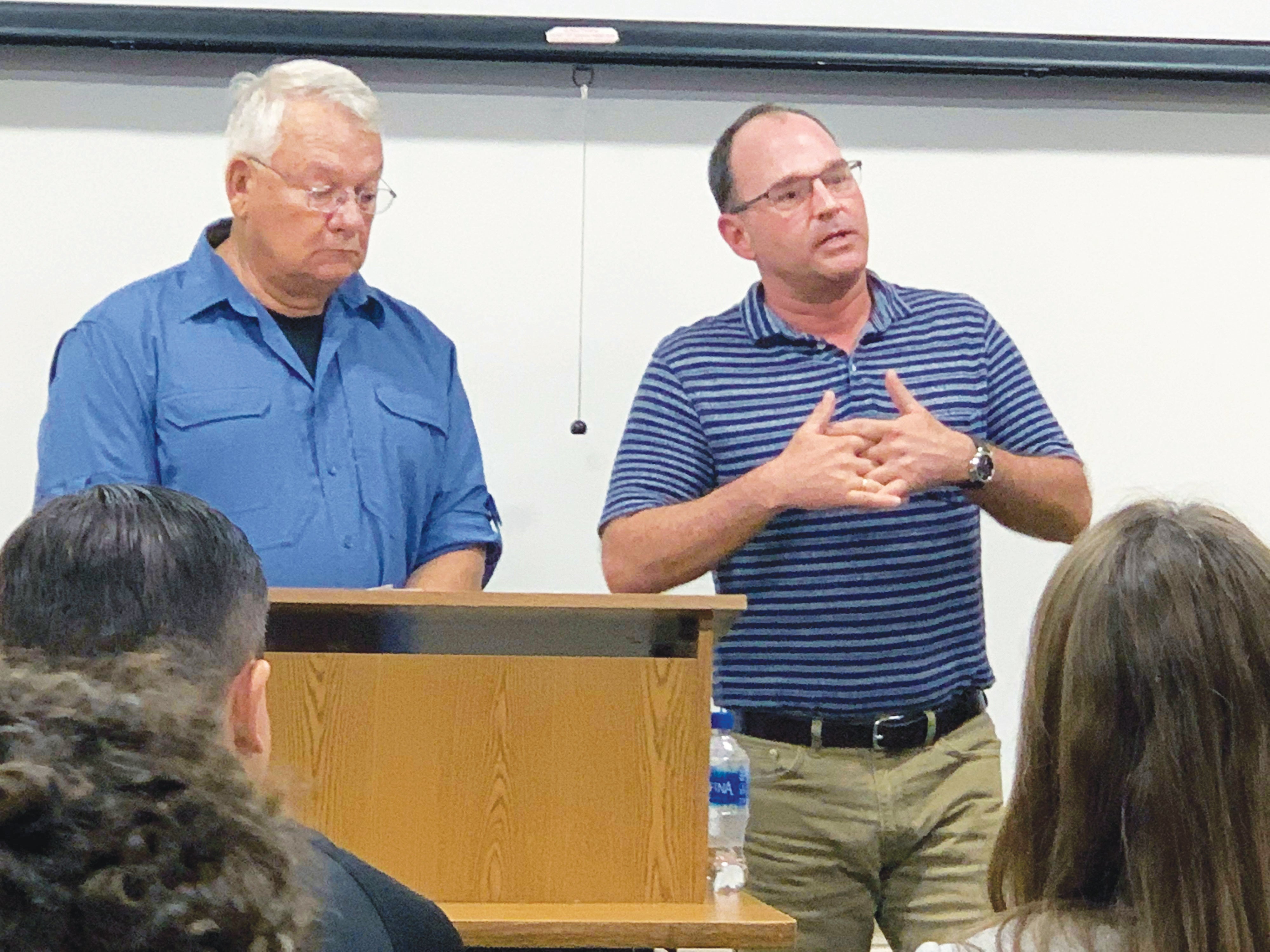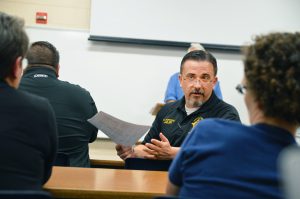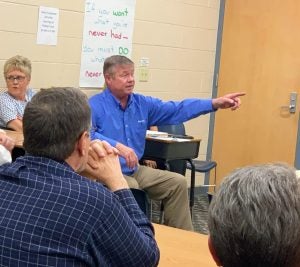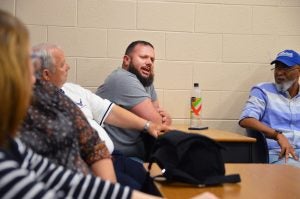Transitional home turned away from neighborhood hopes to open on Industrial Foundation land
Published 9:25 pm Friday, April 12, 2019

- John Albright, left, chair of the Industrial Foundation board, and Andrew Wilkinson, founder of Seeing Hearts Ministry, answer questions Thursday night at Bluegrass Community and Technical College. A neighborhood meeting was held to discuss the plan of a transitional home for men just released from jail in the area. Photo by Bobbie Curd.
Classroom 116 at Bluegrass Community and Technical College was over capacity during Thursday night’s “neighborhood meeting” to discuss a ministry’s plan for a transitional home. Seeing Hearts Ministry, led by Andrew Wilkinson, wants to open the home at 3288 Lebanon Road — formerly the Lawson property, now referred to as the Lynnwood Farm — to help men just released from the Boyle County Detention Center in an attempt to guide them on their journey back into society.
The property is owned by the Boyle County Industrial Foundation, which has already worked out a lease agreement with the ministry, based on Wilkinson’s home plan.
Wilkinson previously tried to open a transitional home in a building at the corner of Sycamore and Beech streets, in a residential Danville neighborhood. But the Danville-Boyle County Board of Adjustments denied a conditional use permit for the plan in August, after hearing numerous objections from residents in the neighborhood.

Boyle County Jailer Brian Wofford explains how a transitional home will help residents with property taxes, as well as support those who are newly released from the jail. Photo by Bobbie Curd.
John Albright, chair of BCIF’s board, opened up Thursday’s meeting by explaining the foundation acquired the land three years ago with the idea of possibly having it re-zoned from agricultural to industrial if a buyer became interested.
“Until then, we’ve got to search for uses for it, and didn’t really have a lot of success on finding a use we were OK with, and that would be on a semi-temporary basis,” he said.
Wilkinson approached BCIF last fall with his idea of creating the transitional home, and Albright said they have been working with him and others involved to create a two-year lease for the property. He said BCIF does not want to rezone the land for now because there are no industrial prospects.
However, the agreement stipulates the ministry will have 90 days to vacate “in the event of economic development,” or 30 days if it is asked “to vacate with cause.”
“But what’s more important is to give neighbors the chance before they read about it … to ask questions,” Albright said.
Wilkinson gave a brief overview of his own story about overcoming addiction, explaining how his life took a turn after his father, former Gov. Wallace Wilkinson (1987-91), left office.
“Some bad things happened, in terms of the financial situation of my father after he left office, and he was forced into involuntary bankruptcy,” Wilkinson said. During this time, his father died and Wilkinson says he lost the structure in his life. “My mother, my brother and I basically were forced out of the state.”
He said he told himself he was “a victim of life,” and entered into a time of fear, confusion and anger, going down a road of self-destruction. In 2006, he ended up in a Florida state prison for four felony counts of drug possession.
Wilkinson got choked up as he said, “On my way to prison, in the back of a prisoner transport van, I accepted the reality of God, and that I needed a savior, and I accepted Jesus Christ into my life.” He spent a year in prison.

Joey Harris, plant manager for Denyo, said if he’s told there’s a place “right down the road” where he can get eight new hires who are drug free, his question will be “when are you going to open another one?” Photo by Bobbie Curd.
Now, Wilkinson thinks he is in a place in life where he can help other men due to the experiences he’s gone through. He emphasized the ministry will not provide clinical addiction treatment, but faith-based programs in a reentry home “where we provide them with support, encouragement, love, control, accountability and structure in their lives.”
Job placement assistance will be offered, he said, as well as transportation and “vital documents they need,” such as a driver’s license, state ID or social security card.
“We’re going to help them set up for health insurance, get them plugged in to our faith-based community and churches, get them into support groups,” he said. “We’re going to be there while they begin the journey of becoming productive members of society. And we’re going to hold them up, and we’re going to take every step with them.”
Wilkinson plans for the home to house up to eight men at once; he said a resident advisor will be hired to live on site. Former inmates will be selected through a process, Wilkinson said, before they are actually released from jail, which will include an interview and assessments. Those with “long rap sheets” of violent offenses and those charged with murder or sex offenses will not be considered.
“We’re looking for men who have accepted the accountability and they know what they did was wrong,” he said.
Wilkinson was questioned about financing; he said they have “several private individuals” who have taken a stake in the ministry, but fundraising will be an ongoing effort. He said he’s looking into corporate grants and state funding available, and “figuring out the direction to go in.”
Other inquiries were made about the duration men will spend, which Wilkinson said depends on each individual’s situation. He said there will be an “after-care” program established, and that he will personally be reaching out to all those who move out to “continue ongoing, 30-day evaluations for them to make sure they’re stable.”
Local resident and teacher Elizabeth Stamps asked Wilkinson about the faith-based aspect of the home. “Now, will you take other faiths beside Christians? If there’s a Muslim? If they show they’re ready to re-evaluate, or is it just for Christians? What about atheists?”
Although most of the programs offered through the home are Christianity-centered, such as weekly Bible study and participation in Celebrate Recovery, a 12-step “Christ-centered program,” Wilkinson said faith is not something that can be forced. He loves sharing how his faith in Christ changed his life, he said, but it’s a decision only “these men can make.”
“We will certainly present the gospel of Christ,” but if the men decide they want to go to AA meetings instead of Celebrate Recovery, they will be held once a week at the home. He said with Christianity, “you live it, you show it, you present it, and God will take care of the rest.”

Roger Fox, program coordinator of the Shepherd’s House, got heated when residents began questioning who would be liable if something happened with the transitional home. “One of the things we have to do is quit talking about it like it’s a group of people that’s separate from us,” he said, and that the only reason he succeeded is because the community “invested” in him. Photo by Bobbie Curd.
“With that said, if I’m interviewing someone and they tell me they are adamantly opposed to the existence of God, they think it’s hogwash, they think that part of our program is a complete waste of time and they don’t want any part of it, if they’re that adamantly against the faith-based-centeredness of what it is we’re doing, I’d say they’re probably not a good fit,” Wilkinson said. But if they’re “willing to accept the activities” the home wants them to engage in, “then yes, there would be a chance they’d be admitted.”
Another person asked how the community can protect itself from declining property values due to the home. Wilkinson said there is “conflicting data with that attitude, or position, that in fact they don’t go down as much as people say that they do.” He pointed to the fact it’s an industrial area “outside of town,” not residential, single-family dwellings.
Jailer Brian Wofford, who supports the transitional home plan, read information from the National Center on Addiction and Substance abuse: “‘If all prisoners with substance abuse problems receive addiction treatment during incarceration, and after-care … the U.S. would break even on costs if just over 10 percent were employed and avoided drugs and crime.’ What does that mean for Boyle County? That means we reduce the long-term expense of running our jail … it’s expensive and it’s going up every day. And also reduce our recidivism rates. So what does that do for you all? It helps keep your property taxes lower.”
Stamps also asked what type of educational opportunities the home will offer. “What about (Bluegrass Community and Technical College)? Are they on board?” she asked.
Wilkinson and Albright said yes, there has been communication with the college, and all indications show the school hopes there will be opportunities for the men to take classes there.
Joey Harris, plant manager of Denyo, mentioned something that hadn’t been touched on yet during the meeting: workforce development. “I see real opportunity … Speaking on behalf of being plant manager of a facility that has 264 employees … we’re casting broad nets right now. We’re hiring people from nine different surrounding counties. So if you tell me there’s a place right down the road that’s going to have eight possibilities of somebody that’s going to show up for work on time … they’re going to be drug free, they’re going to appreciate a job, you know — when are you going to build the next one? To me, I just see it as a huge opportunity.”
When the questions began coming in about “who would be held liable” if something goes wrong at the home, the discussion became a bit heated. It was explained again that the residents will have completed their jail time and would be released with normal parole requirements, but that the foundation or the ministry would not be held any more liable for any incidents than if something happened outside of a business.
However, Albright said there is more research to be done.

Resident Rob Caldwell said the 800-pound gorilla in the room is “who will be next door” to the planned transitional home, and who has skin in the game. Photo by Bobbie Curd.
Resident Rob Caldwell said the initiative sounds great, but the 800-pound gorilla in the room is “who has to be next door to it.” He said he would feel more comfortable about the home “knowing who really has their name on the line in that if there is a hiccup … whether the Industrial Foundation is willing to personally under-sign the effort … and understand they will be held accountable.”
Albright said the foundation has a vested interest “to make sure everything goes the right way. We don’t want something that’s a black eye for the community.”
Someone stated continued concern, using an analogy about “one bad apple” ruining everything, and things got a bit tense.
“One of the things we have to do is quit talking about it like it’s a group of people that’s separate from us,” said Roger Fox, program coordinator for the Shepherd’s House drug recovery program in Danville. “We have to break that barrier down. They’re exactly like you. Let me see, um, I worked all day today. I’ve got finals getting ready to happen, I’m taking care of my kids, but I just got out of prison a few years ago.”
Tanith Wilson, SAP coordinator, said, “Me too.”
“What happened is that this community invested in me, you know? That’s the most important investment you can make, is in another person,” Fox said, adding that housing is the biggest barrier he hears about from his clients who are returning to society.
Wilson added that the concern over “something bad happening” with the men in the house was unfounded; these men were returning to society already, she said, but now they will have a stable environment to return to.
Albright said the next step will be when BCIF applies for a conditional use permit from Danville-Boyle County Planning & Zoning. An exact timeline wasn’t given.






